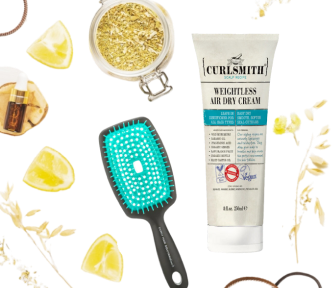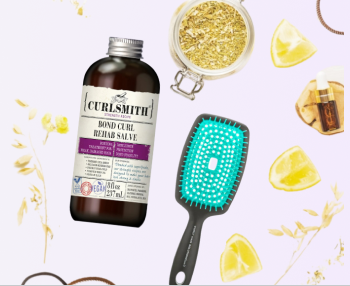Besides moisture, the one other thing that is talked about a lot when it comes to the Curly Girl / Curly Hair Method is protein. This topic seems to get the blame and the glory in equal measure. So what is the right thing for you?
First, just a few hair facts:
- Everyone’s hair needs some protein because the cortex is mostly keratin.
- Protein provides structure and helps to retain moisture.
- Loss of protein is from heat, brushing, color, weather (sun, wind etc.).
- No hair will need protein with every wash, every product or every refresh.
- Avoiding it entirely may not be your best bet.
Hair that loves protein is usually higher porosity, finer texture, has colour/highlights, is dried regularly using heat or a combination of these traits. The more damage that you have will mean your hair needs and likes those proteins to fill in the chips and cracks and help keep that moisture in.
If I had to guess, I would say that most of the products that market for protein, strength etc. that you buy off the shelf will have a mix of protein plus some moisture (water) and emollients (oils, butters). Take a look at the ingredients and if you see protein in the first 5-7 ingredients, this makes the product stronger in protein. If protein is somewhere in the middle of the ingredients you can call that medium, and towards the bottom it is light in protein.
What is a protein?
If you're shopping for a protein-based product, look out for these words in the ingredient list:
- "Hydrolyzed" means it is not a whole protein. It has been treated with fermentation or acids to create something that is able to penetrate into the hair. What you usually see as hydrolyzed ingredients is silk, corn, soy, pea, collagen, keratin, wheat, oat, barley, rice, quinoa.
- Aminos and Peptides. These are the smallest proteins like cystine, lanine, serine, valine, proline, threonine, isoleucine, histidine, and phenylalanine.
As you can see, there are many types of proteins and they are different sizes. Higher porosity and/or damaged hair will usually like most proteins. Lower porosity and healthier hair tends to like the smaller proteins. My advice is to choose a variety of protein sizes for the maximum boost and if your hair reacted badly to one type of protein try something else.

How can I tell if my hair needs protein?
You may need protein if your hair:
- Has some damage (from colour, heat, etc.)
- Is frizzy
- Lacks your normal definition
- Breaks easily
- Falls flat quickly and won’t hold your wave/curl pattern
- Feels overly soft
- Loses its bounce
- Remains dry despite conditioning
- Feels mushy when wet
If you have too much protein it feels:
- Like your hair is breaking off
- Stiff
- Straw-like
- Frizzy
- Overly soft (surprise answer)
Yes you read that right! Too much protein can in some cases give overly soft hair! Why? Well my short answer is…. Too much protein will increase the effect of your moisturizing ingredients.
A bit more about this too much protein and overly soft hair. Proteins act as humectants and bind to moisture ingredients. Remember that many ingredients in conditioners do not rinse completely off and that is how we get the smoothing effect (read my blog post How and Why to Condition Your Hair for more information about this). So if we add more support than what our hair needs instead of it being inflexible it becomes overly flexible.
Product Recommendations
If you are interested in adding more protein to your routine, here are my top suggestions for products to try:
-
Bond Curl Rehab Salve, the new protein treatment from Curlsmith, uses vegan creatine protein. It is 4th in the ingredients list so this would be a strong small protein.

- Matcha Boost Protein Shake from Ecoslay has hydrolyzed quinoa and keratin protein. This is a large and a small protein mix.
- Silk Conditioner from Curl Keeper is a light small protein (silk) that can be used as a daily or a deep conditioner.
- Hydrating Hair Masque from Innersense I would classify as a medium protein treatment. The first ingredients are moisture and emollients followed by a mix of amino and hydrolyzed proteins.
- Mielle Organics Babassu Mint Deep Conditioner is a medium-high protein conditioner with moisture, emollients and amino acids.
- Aphogee 2 Step Protein Treatment is one of the stronger protein treatments that uses hydrolyzed collagen. Follow the instructions on the packages exactly and don’t touch your hair when it is in there to avoid breakage. Follow up with the second step (it has a silicone) or your own deep conditioner with lots of moisture.
You can also use Gelatin as a DIY pure protein treatment. It is not vegan-friendly (obviously). Other DIY vegan-friendly ideas are Braggs liquid aminos (soy) or a dark beer rinse. There are a few recipes in the links at the end of this article.
What if my hair doesn't like protein?
If your hair reacted to a protein, don’t avoid all protein. It might not have liked another ingredient(s) in that product. Or you needed a different size or a different amount of protein. In all likelihood your hair didn’t like the entire formula of that product.... Or you are still new to the method and figuring this all out!
If you are colouring and/or highlighting your hair, protein treatments plus Olaplex 0 and 3 should be part of your routine. Remember Olaplex 0 and 3 are not protein and not moisture but a patented bond rebuilder. Patented means there is no dupe.
For More Information...
When I started this blog my first thought was how to make this topic easy to take in? So I am going to stop here and leave below a lot of information that I used as a reference. As much as science can tell us about specific ingredients, nothing can really replace trying and experimenting with your products. We will all (even same hair texture, porosity, and density) have different experiences. And that’s why I say the method is never, ever boring. ☺
Here are some great links if you want more information:
- Krista Leavitt and Dr. Susan Walker (Earthtones Naturals) on protein (It is 1.5 hours long)
- Science-y Hair Blog: Protein 101
- Science-y Hair Blog: More About Protein
- Science-y Hair Blog: Mysteries of Hydrolyzed Proteins
- Science-y Hair Blog: Gelatin Protein Treatment Recipe & FAQs
- Science-y Hair Blog: Vegetarian-Friendly Protein Treatments
- Science-y Hair Blog: My Hair Can't Seem to Get Enough Protein








